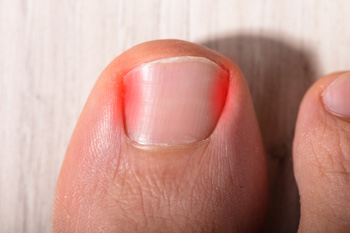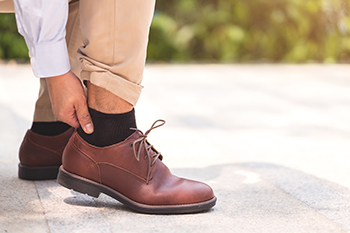Items filtered by date: July 2022
Ingrown Toenail Surgery Pain

Ingrown toenails are a common yet uncomfortable and potentially painful foot condition. This unsightly condition occurs when the side of a toenail essentially grows into the skin. If the toenail is cut too short or if it has a natural curved shape, the nail may be especially prone to growing into the skin. This condition is most common in the big toe. There are a variety of home remedies to treat ingrown toenails. However, if these remedies do not work or if you have multiple ingrown toenails, your podiatrist may recommend undergoing a surgical procedure. This procedure might include removing part of the nail or the entire affected nail. Many patients are curious to know whether or not this procedure is painful. Although each patient’s experience is unique, there is information about this procedure that may be applicable to you. For example, before the surgical procedure, you may need an anesthetic injection that can potentially be uncomfortable for some patients. However, many patients report that the actual procedure following the injection is quite painless. After the procedure, you might experience pain when the numbness slowly abates. To treat this pain following the procedure, you might be able to use over-the-counter medications. If you are curious about the pain you could feel during a surgical procedure to remove an ingrown toenail, speak to your podiatrist.
Ingrown toenails can become painful if they are not treated properly. For more information about ingrown toenails, contact one of our podiatrists of Quad Cities Foot and Ankle Associates. Our doctors can provide the care you need to keep you pain-free and on your feet.
Ingrown Toenails
Ingrown toenails occur when a toenail grows sideways into the bed of the nail, causing pain, swelling, and possibly infection.
Causes
- Bacterial infections
- Improper nail cutting such as cutting it too short or not straight across
- Trauma to the toe, such as stubbing, which causes the nail to grow back irregularly
- Ill-fitting shoes that bunch the toes too close together
- Genetic predisposition
Prevention
Because ingrown toenails are not something found outside of shoe-wearing cultures, going barefoot as often as possible will decrease the likeliness of developing ingrown toenails. Wearing proper fitting shoes and using proper cutting techniques will also help decrease your risk of developing ingrown toenails.
Treatment
Ingrown toenails are a very treatable foot condition. In minor cases, soaking the affected area in salt or antibacterial soaps will not only help with the ingrown nail itself, but also help prevent any infections from occurring. In more severe cases, surgery is an option. In either case, speaking to your podiatrist about this condition will help you get a better understanding of specific treatment options that are right for you.
If you have any questions please feel free to contact our offices located in Bettendorf, and DeWitt, IA and Rock Island, IL . We offer the newest diagnostic and treatment technologies for all your foot and ankle needs.
Simple Fall Prevention Methods

Research has indicated that approximately one in three adults fall at least once per year. This can lead to serious foot injuries that can hinder completing daily activities. There are simple methods that can be implemented that may help to reduce falling episodes. When the lighting is improved in the household, it will become easier to see steps and obstacles that may be easy to trip over. Additionally, removing frayed rugs can reduce the number of falls incurred, and it is important to hold on to handrails while going up and down the steps. Many patients find it helpful to install grab bars in the shower and toilet area, and using a non-skid bathmat can provide stability in the shower. When a walker or cane is used, the sense of balance is often increased, and it is beneficial to keep a phone within reach in case a mishap occurs. It is helpful to have routine physical and eye exams performed, and this is needed to monitor existing medication and eyeglasses. If you would like more information about how falling can affect the feet, and effective fall prevention methods, please consult with a podiatrist.
Preventing falls among the elderly is very important. If you are older and have fallen or fear that you are prone to falling, consult with one of our podiatrists from Quad Cities Foot and Ankle Associates. Our doctors will assess your condition and provide you with quality advice and care.
Every 11 seconds, an elderly American is being treated in an emergency room for a fall related injury. Falls are the leading cause of head and hip injuries for those 65 and older. Due to decreases in strength, balance, senses, and lack of awareness, elderly persons are very susceptible to falling. Thankfully, there are a number of things older persons can do to prevent falls.
How to Prevent Falls
Some effective methods that older persons can do to prevent falls include:
- Enrolling in strength and balance exercise program to increase balance and strength
- Periodically having your sight and hearing checked
- Discuss any medications you have with a doctor to see if it increases the risk of falling
- Clearing the house of falling hazards and installing devices like grab bars and railings
- Utilizing a walker or cane
- Wearing shoes that provide good support and cushioning
- Talking to family members about falling and increasing awareness
Falling can be a traumatic and embarrassing experience for elderly persons; this can make them less willing to leave the house, and less willing to talk to someone about their fears of falling. Doing such things, however, will increase the likelihood of tripping or losing one’s balance. Knowing the causes of falling and how to prevent them is the best way to mitigate the risk of serious injury.
If you have any questions, please feel free to contact our offices located in Bettendorf, and DeWitt, IA and Rock Island, IL . We offer the newest diagnostic and treatment technologies for all your foot care needs.
Wounds That Don't Heal Need to Be Checked
Chef’s Feet

Professional chefs spend many hours a week on their feet cooking. Their days often involve a continuous day of standing, walking, bending, lifting, and turning at odd angles. Being on one’s feet so much will eventually take a toll. It might start with sore feet at the end of the day but often gradually starts to involve other parts of the body as everything is interconnected. It is important for anyone in this profession, and any other job that requires long hours of standing, to take proper care of their feet. If not, one will be in constant pain, productivity will be impacted, and the passion for cooking will take a back seat to aches and pains. A cook can delay or diminish foot pain by doing some simple things, including wearing shoes that fit well, are supportive, and have proper cushioning. Other tips are lifting properly and not more than can be handled, and wearing white socks, because colored socks have dye that can seep into pores when one sweats. Sitting (at least when eating) to take some of the pressure off the feet, as well as staying active and stretching when not working to keep limber may also help. Do as much as you can to take care of your feet if you are working on your feet all day. If you cannot get on top of the pain yourself, see a podiatrist for additional tips and treatment.
While working on the feet, it is important to take the proper care of them. For more information about working on your feet, contact one of our podiatrists from Quad Cities Foot and Ankle Associates. Our doctors will treat your foot and ankle needs.
Working on Your Feet
Standing on your feet for long periods of time can cause stress and pain in your feet. Your whole body may experience change in terms of posture, back pain, bunions, callouses and or plantar warts. There are ways to avoid these conditions with proper foot care, smart choices and correct posture.
Positive Changes
Negative heeled shoe – Choosing this shoe type places the heel slightly lower than the ball of the foot. These are great for overall foot health. Find shoes that fit you correctly.
Go barefoot – Our feet were not designed to be enclosed for all hours of the day. Try to periodically expose your feet to air.
Eliminate Pain
Foot Exercises – Performing simple exercises, incorporating yoga and doing stretches are beneficial. This will allow increased blood flow to the area and muscles of the foot.
Achilles tendon – Stretching the foot out flat on the floor will relax the calf muscles and tendon. These exercises can be performed almost anywhere. Make sure you add these exercises to your daily regimen.
With a little bit of this information and knowing more about foot health, you will notice changes. Foot stretches and proper footwear will help with pain and prevent further issues.
If you have any questions please feel free to contact our offices located in Bettendorf, and DeWitt, IA and Rock Island, IL . We offer the newest diagnostic and treatment technologies for all your foot and ankle needs.
Recovery From Bunion Surgery

Patients who have had bunion surgery often find it takes approximately three to six weeks for a complete recovery. The side effects are generally minimal, and the bunion is gone permanently. Typical bunion surgery is often done as an outpatient and takes approximately one hour. Special shoes that minimize the pressure on the wound are often worn after surgery. It is beneficial to keep the foot elevated as often as possible during the first six weeks of recovery as this may help to reduce swelling. Additionally, it can help to allow excess fluid to drain away. It is important to keep walking to a minimum, especially during the early stages of recovery. Some patients find it helpful to use crutches as they keep the affected foot off the ground. The wound from the surgery will heal properly when the dressings are kept in place for a few weeks and remain dry. This enables the toes to heal in the proper position. Bunion surgery is an effective treatment for permanent removal, and it is suggested that you consult with a podiatrist who can determine if this is correct for you.
Foot surgery is sometimes necessary to treat a foot ailment. To learn more, contact one of our podiatrists of Quad Cities Foot and Ankle Associates. Our doctors will assist you with all of your foot and ankle needs.
When Is Surgery Necessary?
Foot and ankle surgery is generally reserved for cases in which less invasive, conservative procedures have failed to alleviate the problem. Some of the cases in which surgery may be necessary include:
- Removing foot deformities like bunions and bone spurs
- Severe arthritis that has caused bone issues
- Cosmetic reconstruction
What Types of Surgery Are There?
The type of surgery you receive will depend on the nature of the problem you have. Some of the possible surgeries include:
- Bunionectomy for painful bunions
- Surgical fusion for realignment of bones
- Neuropathy decompression surgery to treat nerve damage
Benefits of Surgery
Although surgery is usually a last resort, it can provide more complete pain relief compared to non-surgical methods and may allow you to finally resume full activity.
Surgical techniques have also become increasingly sophisticated. Techniques like endoscopic surgery allow for smaller incisions and faster recovery times.
If you have any questions please feel free to contact our offices located in Bettendorf, and DeWitt, IA and Rock Island, IL . We offer the newest diagnostic and treatment technologies for all your foot and ankle needs.

